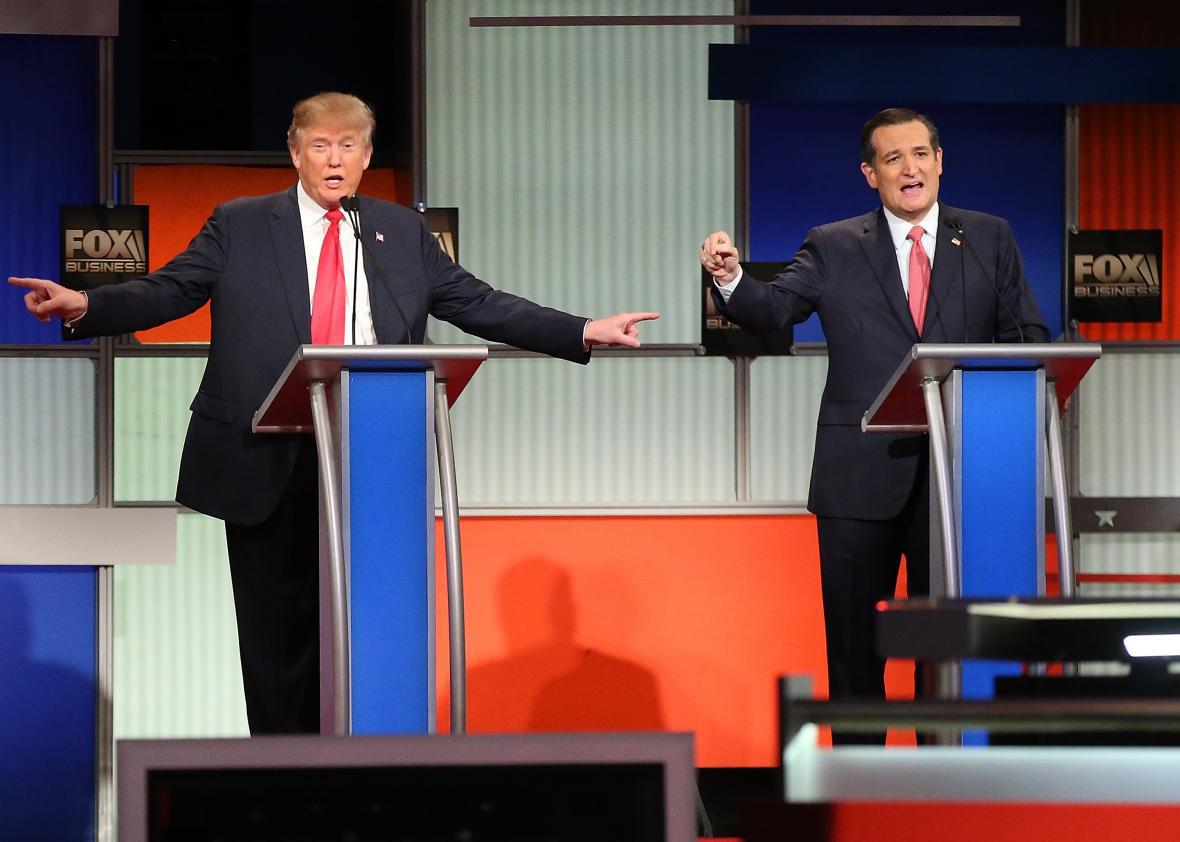Thursday night’s Republican debate in South Carolina was the culmination of every nightmare establishment Republicans have had since Donald Trump entered the race in June. From the instant Trump rocketed to the top of opinion polls soon after he began campaigning, party bigwigs and more moderate primary voters have been waiting for the moment when sanity would finally rear its head: Trump would eventually see his numbers drop—along with Sen. Ted Cruz’s and Ben Carson’s, for that matter—as voters got serious, the expectation went. Those voters would carefully evaluate the men (and woman) running and choose the person with the proper temperament and experience. But with the Iowa caucus barely more than two weeks away, Republican voters remain uninterested in typical credentials or establishment connections. And thanks to Thursday’s debate, we also now know that the so-called insurgent candidates are more skillful at politics, too. Trump and Cruz were again the winners in the actual forum, and it’s still not clear what is going to stop them from winning when the actual voting starts.
The expectations that debates might do in Trump now seem silly in retrospect. It’s not as if nonestablishment candidates have never been adept on debate stages. Newt Gingrich was a superb debater, and those performances helped him in his 2012 nomination fight against Mitt Romney, before he was buried under a big, fat pile of campaign cash. On the other hand, Cruz is extremely well-funded; Trump doesn’t really need money, given his gift for free publicity and personal wealth; and neither man has displayed any of Gingrich’s glaring political weaknesses. In short, they are probably not going to be defeated with television ads. But as Thursday’s debate showed, they probably aren’t going to be defeated onstage, either.
When Cruz and Trump started really going after each other early in the debate, it appeared that they could in fact inflict—and suffer—some serious wounds. Normally two-man combat hurts both combatants and helps someone else in the field. (John Kerry and John Edwards both benefited greatly in 2004 when Howard Dean and Dick Gephardt tore each other apart in Iowa.) But the back-and-forths Thursday night showed both men to be engaged and politically capable, skillful in their answers and acute in the way they appealed to the base.
Cruz’s debating skills have at this point been picked over endlessly, but they really are almost creepily impressive. From the first question of the night, when he initially ignored an answer on jobs by decrying the recent naval incident in Iran (facts be damned), and then got extra time to talk about jobs anyway, he was entirely on his game. When he was questioned about a recent New York Times story detailing a loan his Senate campaign received (and didn’t report) from Goldman Sachs, he brilliantly pivoted to an attack on the Times itself.
When it came to his spats with Trump, he initially seemed to deliver some damaging blows. He attacked Trump over the latter’s embrace of “New York values” and was articulate in beating back against the birther controversy that Trump has dredged up. But each time Trump responded well, once going into a surprisingly heartfelt (for Trump) remembrance of what New York City was like after 9/11. A later answer from the businessman on why he’s so angry was perfect red meat for Republicans voters. Trump’s ability to display rather than “feel” other people’s anger probably explains a good deal of his appeal among a Republican electorate that has simply gotten angrier the more years Barack Obama has been in office. And his political learning curve, in the limited amount of time he has been campaigning and debating, is simply remarkable.
The other men onstage had their occasional moments but didn’t appear to be in the same league. Sen. Marco Rubio remains the most polished of the field, but the anger he displayed in this debate felt practiced and phony. (He did get in some good attacks on Cruz’s record, but they occurred very late in the debate and after an attack he launched against Cruz on taxes seemed to fizzle.) Neither New Jersey Gov. Chris Christie nor Ohio Gov. John Kasich made much of an impression. Former Florida Gov. Jeb Bush tried to take on Trump’s promise to ban Muslims from entering the United States, but he was essentially reduced to arguing that bigotry was bad because, well, some of our allies are Muslim.
Trump remains well ahead in national polls, while Cruz is clinging to a narrow lead in Iowa. If the Texas senator were to win there, he could even finish second in New Hampshire—where Trump is ahead—and potentially cement his lead over his more moderate rivals. It wasn’t supposed to be this way. And perhaps, in the end, it won’t be: Rubio still has a good chance at the nomination. But the idea that once voters began paying attention they would turn away from the less serious candidates was dependent on the idea that Cruz and Trump would seem less serious to Republican voters. For seven months, we’ve waited for these guys to see their support collapse. Thursday’s debate not only kept them riding high; it also demonstrated why they may stay aloft for a long, long time.
